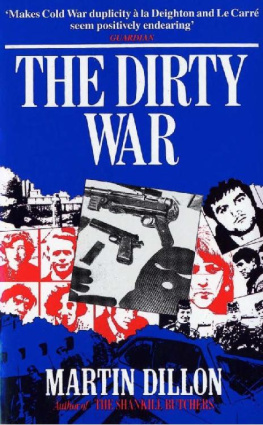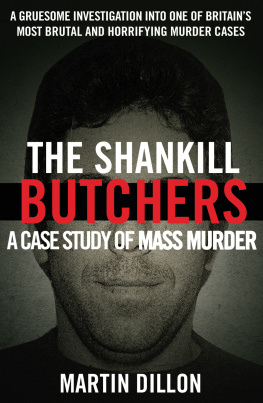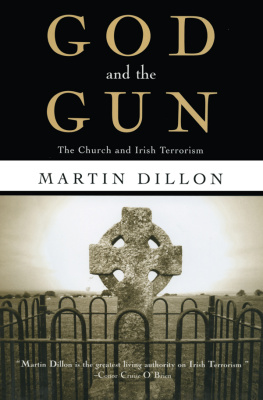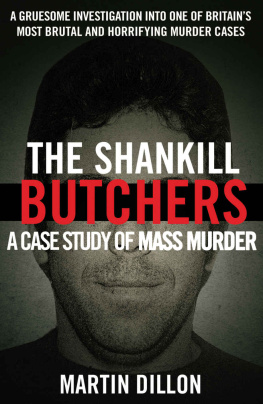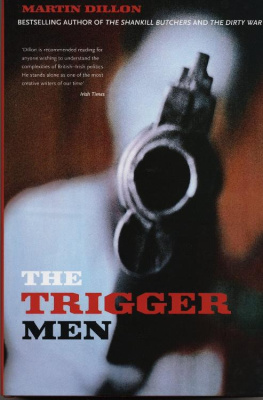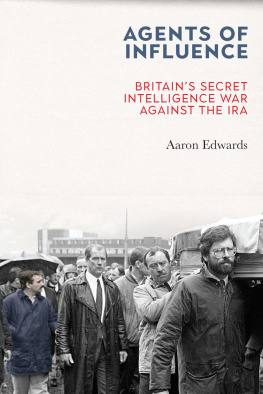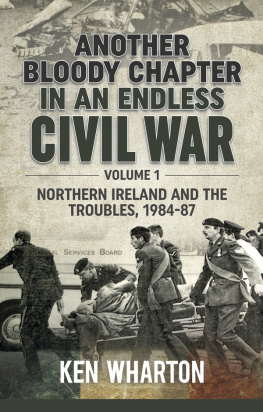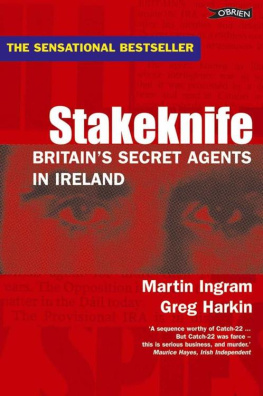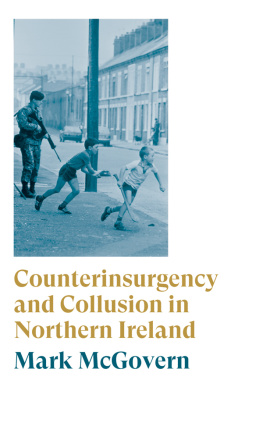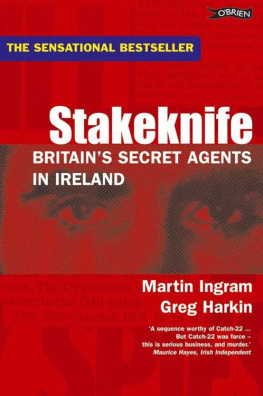Contents
About the Book
1969 was a year of rising tension, violence and change for the people of Northern Ireland. Rioting in Derrys Bogside led to the deployment of British troops and a shortlived, uneasy truce. The British army soon found itself engaged in an undercover war against the Provisional IRA, which was to last for more than twenty years.
In this enthralling and controversial book, Martin Dillon, author of the bestselling, The Shankill Butchers, examines the roles played by the Provisional IRA, the State forces, the Irish Government and the British Army during this troubled period. He unravels the mystery of war in which informers, agents and double agents operate, and reveals disturbing facts about the way in which the terrorists and the Intelligence Agencies target, undermine and penetrate each others ranks.
The Dirty War is investigative reporting at its very best, containing startling disclosures and throwing new light on previously inexplicable events.
About the Author
Martin Dillon is a native of Belfast although educated in England. He lived in France for a time and returned to Northern Ireland to work as a journalist with the Irish News before joining the Belfast Telegraph. He has also worked as a freelance journalist for several national newspapers and American periodicals. In 1973 he wrote Political Murder in Northern Ireland (with Denis Lehane) which is regarded as the definitive study of political assassination in Northern Ireland. His second book, Rogue Warrior of the SAS (with Roy Bradford), is a biography of the Second World War hero, Lt. Col. Robert Blair Mayne, and is published by Arrow. The Shankill Butchers which was a bestseller in both Ireland and Britain, was the first in his trilogy of books about Northern and Southern Ireland.
Martin Dillon has written plays for BBC radio and television and has been Editor in Northern Ireland of many of the BBCs programmes in the area of current affairs. He now works for the BBC History Unit in London.
Also by Martin Dillon
THE SHANKILL BUTCHERS
KILLER IN CLOWNTOWN
STONE COLD
The Dirty War
Martin Dillon

I dedicate this book to my parents, Maureen and Gerard,
for their constant love and support while I write about
difficult times in a difficult society

List of Illustrations
British troops at Belfast Docks, August 1969 (Pacemaker Press Int. Ltd)
Soldiers initially hailed as liberators by Catholics (Pacemaker Press Int. Ltd)
Gerry Fitt, outside ruins of home, 1983 (Pacemaker Press Int. Ltd)
Paddy Devlin outside home, 1972 (Pacemaker Press Int. Ltd)
Louis Hammond (Pacemaker Press Int. Ltd)
Andrew Murray (Pacemaker Press Int. Ltd)
Michael Naan (Pacemaker Press Int. Ltd)
Robert Nairac as a boxer (Oxford Mail)
Robert Nairac in Guards uniform (Press Association)
Miami showband, 1972 (Pacemaker Press Int. Ltd)
Colin Wallace (Pacemaker Press Int. Ltd)
Seamus Grew (Pacemaker Press Int. Ltd)
Ronnie Bunting and his wife, Suzanne (Pacemaker Press Int. Ltd)
Gerry Mahon and his wife, Catherine (Pacemaker Press Int. Ltd)
Bernadette McAliskey (ne Devlin) after being shot by UDA (Pacemaker Press Int. Ltd)
Car in which Toman, McKerr and Burns were shot dead (Pacemaker Press Int. Ltd)
Colonel Muammar al-Qadhafi (Press Association)
John Stalker (Press Association)
Imitation weapons and masks used by betting-shop robbers who were shot dead in Belfast (Pacemaker Press Int. Ltd)
Bodies of two of the betting-shop robbers (Pacemaker Press Int. Ltd)
Acknowledgements
It is not possible to name everyone who assisted me. Many work within the security forces and to name them would place their lives in jeopardy or compromise them professionally. The majority of them spoke to me out of a genuine interest in what I was writing and to clarify previous reports of episodes in which they or their colleagues were involved. In all instances I sought them out for interview and established my own terms of reference for our conversations. Politicians on both sides of the political divide in Northern Ireland provided me with off-the-record briefings and I respect their wish to remain anonymous.
I thank David Ross of the BBC in Northern Ireland for assisting me in researching the material for this work, providing creative journalistic perspectives and spending many hours making sense of legal reports of terrorist trials. Linden Stafford was invaluable as an adviser and editor on this book. She possessed a genuine interest in the work and constantly encouraged me to broaden the material to explain a wider conflict which is the backdrop to the dirty war. She deserves special praise for her unceasing effort and her consummate professionalism. The writer, Frank Delaney, provided the impetus which set me on the road to write a trilogy of books on Ireland and Richard Cohen, my editor at Hutchinson, and Anthony Cheetham believed in the project and gave this book their full support. I am indebted to my wife, Kath, and our children, Crawford and Nadia, for living with the pressures created by writing this trilogy in a violent society, and to Kathy in particular for her imaginative appraisal of the work in its many and varied stages. In the world of print journalism and broadcasting I was given assistance by many people. Foremost among them was Chris Moore, a television reporter with the BBC in Northern Ireland. As a fellow writer and journalist with a genuine affection for Northern Ireland and a deep knowledge of the conflict he supplied me with interesting angles on several stories and some exciting documentation in relation to very sensitive matters. Others who deserve special mention are Martin OHagan, a reporter with the Sunday World newspaper, who provided me with some research material and was abducted and interrogated by the IRA while this book was in progress. The northern editor of Sunday World, Jim Campbell, made it possible for me to reach an acute understanding of several complex issues. Others who were willing to discuss matters with me included David McKittrick of the Independent, John Ware of the BBC Panorama programme and Chris Ryder of the Daily Telegraph. Duncan Campbell was kind enough to provide me with copies of material which he published and Pacemaker Press in Belfast proved once again that they have one of the best photographic library services in these islands. The typing of this manuscript and the tasks associated with having much of this material in advance of publication rested with a trusted friend, Jean Jordan, now retired from the BBC Newsroom in Belfast but a true professional who helped with a difficult task. Adele Gilding in the BBC Library was kind in finding a range of reference books and ensuring that I kept possession for long periods. Finally, in writing the first two books in this trilogy there are those who by their very proximity to my life and their views on all matters connected with Northern Ireland are, were and remain an invaluable source of creative thought. They include Gerard and Maureen Dillon, Brian and Kate Garrett, Dr Conor Cruise OBrien, Ian and Cecilia Kennedy, Professor Paul Bew, Brian and Anne Turley, Dr Tony Stewart whose book,
Next page
